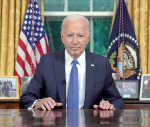You are here
Seeking pragmatic order amidst chaos in the Middle East
Feb 11,2024 - Last updated at Feb 11,2024
As we find ourselves in the tumultuous beginning of 2024, the Middle East finds itself once again entangled in escalating tensions and geopolitical complexities. The recent Iranian proxy attack on American military assets has sparked concerns about the region's trajectory. In this volatile landscape, the pursuit of an ideal compromise seems distant, as each actor strives to showcase strength and safeguard their respective interests. If regional actors, such as Iran and its proxies, perceive a weakened US presence and influence, it may embolden them to engage in more aggressive actions. Pro-Iran militias, insurgent groups, or other adversaries may see an opportunity to challenge American interests or expand their own influence, leading to an escalation of conflicts and insecurity in the region
The stakes are high, with American President Joe Biden determined to dispel any perception of weakness as he heads to the upcoming election cycle. Concurrently, the Houthis and other Iranian proxies refuse to back down despite the devastating humanitarian consequences for their people. Israeli prime minister Benjamin Netanyahu, facing international scrutiny, remains steadfast in his policies, while the Iranians seek to assert their disruptive capabilities and advance their interests on the global stage. Unfortunately, these ideological and domestic pressures suggest that the outcome is likely to fall short of optimal.
Adding to the complexity, the rise of neo-populist movements worldwide has further complicated the path to order and compromise. The connection between electoral politics and the pursuit of mutual interests appears to have eroded. A headline from the Israeli newspaper Haaretz, "Israel is heading towards street battles between the far-right and families of hostages," exemplifies the widening gap between political dynamics and the pursuit of common goals. Where has the spirit of compromise gone?
In this context, the year 2024 looms as a monumental electoral year in world history, characterised by disorder and unrest. The reported deaths of over 26,000 Palestinians in Gaza, Israeli officials dismissing the legitimacy of a Palestinian state, and the absence of a political horizon exemplify the deep-rooted challenges. The recent ruling by the International Court of Justice (ICJ), complex and enigmatic, adds another layer of uncertainty to the situation. While its implications remain subject to interpretation, it is crucial to consider the legal merits, meaning and future repercussions of this ruling.
Moreover, the news of renewed US and UK military actions in Yemen, amidst relentless Houthi attacks on Red Sea shipping, intensifies the specter of American retaliation for the recent Iranian drone attack. Yet, solutions to these multifaceted challenges remain elusive, overshadowed by political posturing and short-term thinking.
To address the pressing issue of Gaza, it is imperative to shift our focus to the aftermath of the conflict and devise a comprehensive plan for the future. Mere calls for a ceasefire will not yield sustainable results. Some propose an establishment of a condominium of states to facilitate interim governance in Gaza and the wider Middle East. Such an approach would weaken Iran influence and mitigate the risks of further escalation.
Equally alarming is the rise of various conspiracy theories. These unfounded and perilous beliefs, as absurd as they may be, hold the potential to significantly impact voting patterns. The perception of declining US power can contribute to a sense of instability in the Middle East region. As the United States has played a crucial role in maintaining regional stability and security, a perceived power vacuum could lead to power struggles and a lack of effective governance. This, in turn, may create conditions conducive to extremist groups, insurgency or civil unrest. If regional partners perceive a diminishing US power, it may erode their confidence in the United States as a reliable ally. This can strain diplomatic relationships and weaken alliances, potentially reducing cooperation on shared security concerns. Weakened alliances could undermine collective efforts to address regional challenges such as terrorism, regional conflicts, or the proliferation of weapons of mass destruction.
In conclusion, as the Middle East grapples with escalating tensions and shifting dynamics, the pursuit of order must take precedence over political posturing. Pragmatic and inclusive solutions, supported by regional stakeholders and international partners, are necessary to foster stability, mitigate humanitarian crises and safeguard common interests. Only through a concerted effort to bridge divides and commit to long-term solutions can the Middle East hope to achieve a semblance of lasting order.













Add new comment